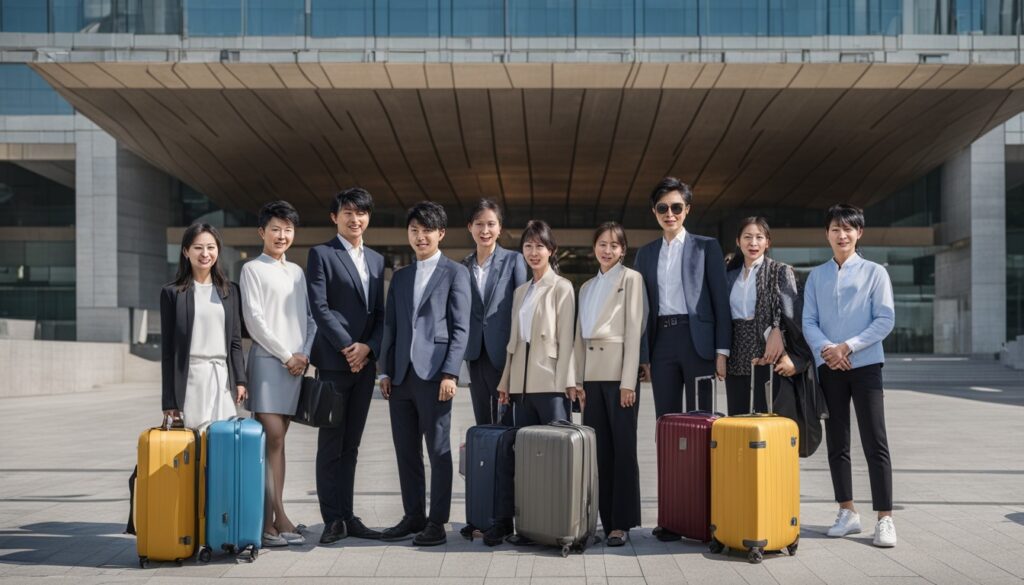The South Korea Residence Permit Guide 2025 offers an essential overview for expatriates eager to navigate the intricate South Korea visa requirements and immigration procedures in South Korea. With over one million expatriates residing in South Korea, especially in bustling cities like Seoul, understanding the available residency options is vital for anyone looking to establish a long-term stay in South Korea. This guide delves into different visa types, outlines application processes, and highlights pathways to permanent residency and citizenship, equipping readers with the knowledge needed for smooth integration. For more detailed information regarding various residence permits, visit this helpful resource1.
Key Takeaways
- Understand the types of residence permits available in South Korea.
- Know the necessary documentation for different visa applications.
- Familiarize yourself with the application procedures for long-term stays.
- Explore eligibility criteria for obtaining permanent residency.
- Learn about the importance of immigration lawyers in the application process.
Contact us if you are Interested in Buying Property Abroad!
Understanding South Korea’s Immigration Landscape
South Korea’s immigration policies cater to a diverse range of foreign nationals wishing to live and work in the country. The framework is designed to attract talent while maintaining a robust regulatory environment. Recently, enhancements in immigration procedures in South Korea, such as the introduction of the new South Korea Residence Permit, showcase a commitment to inclusiveness, simplifying the lives of expatriates living in South Korea.
Overview of South Korea’s Immigration Policies
The South Korea immigration landscape is dynamic, with policies aimed at professionals, investors, students, and family reunification. Visa categories have become more tailored, offering options like temporary and long-term residence permits. The recent introduction of the digital nomad visa set to launch in 2025 will allow remote workers to stay for up to one year, with the possibility of renewal for an additional year2. For remote workers, earning eligibility stipulates a required income of approximately $64,000, which is double South Korea’s gross national income per capita from the previous year2.
Current Trends in Expatriate Living
Trends indicate rising interest in expatriate living in South Korea, driven by high-quality living standards and job prospects in technology and education. Many expatriates are transitioning from temporary visas to more stable residence permits. Additionally, expatriates can bring their spouse and children under 18 without the need for extra visas when applying for the digital nomad visa2. As Korea aims to attract 20 million foreign tourists in 2025, the potential for cultural exchange and business opportunities is expanding2.
Types of South Korea Residence Permit

South Korea offers various types of residence permits to accommodate individuals with different immigration needs. Understanding these categories can greatly assist in navigating the complex South Korea immigration procedures. The primary types of residence permits include temporary and long-term visas, work permits, investor and business visas, and family reunion permits.
Temporary and Long-Term Residence Visas
South Korea temporary residence visas are typically issued for one year and depend on the applicant’s reason for immigration. Long-term residence visas, such as F-2 and F-5 visas, provide extended stays and potential pathways to permanent residency. These options cater to various groups, including professionals, students, and spouses of South Korean citizens, reflecting the diverse immigration requirements in South Korea and allowing for lasting connections.
Work Permits and Employment Visas
South Korea work permits are essential for expatriates who wish to work beyond 90 days. Various employment visas are available, including E-1 for professors, E-2 for foreign language teachers, and E-7 for specialized occupations. The application process for these visas often requires a job offer from a Korean employer, aligning skills and qualifications to the demands of the workplace, further highlighting the structured nature of South Korea immigration procedures.
Investor and Business Visas
For those looking to start or invest in a business, South Korea investor visas are tailored to facilitate entrepreneurial endeavors. The D-8 corporate investment visa and F-2-7 long-term visa for business professionals are prominent options. Typically, a minimum investment of KRW 500 million (approximately USD 370,000) is required, along with a demonstration of financial viability and job creation for locals, supporting the business visas initiative aimed at integrating foreign entrepreneurs into the economy.
Family Reunion Permits
South Korea family reunion permits allow spouses and dependent children of South Korean citizens or permanent residents to join their families. Eligibility hinges on providing documentation, such as marriage certificates or birth certificates. Most applicants will apply for an F-3 visa, which is linked to the validity period of the primary applicant’s visa, thereby ensuring family unity within the framework of immigration for families.
Applying for a South Korea Residence Permit

Understanding the South Korea immigration landscape is crucial for prospective applicants seeking a residence permit. Eligibility and requirements vary by visa type, but all applicants must meet certain standards to ensure a smooth process.
Eligibility and Requirements
Eligibility for a South Korea residence permit is largely dependent on the specific visa category. The South Korea visa eligibility criteria generally include possessing a valid passport, maintaining good character, and fulfilling job or educational qualifications. For example, work permits necessitate a confirmed job offer, whereas investor visas require proof of significant investment. Applicants aiming for family reunion permits must provide documentation that substantiates their familial connections to South Korean nationals or residents.
Contact us if you are Interested in Buying Property Abroad!
South Korea Visa Application Process
The South Korea visa application process begins with selecting the appropriate visa type to align with the applicant’s intentions. It is mandatory to schedule an appointment at the immigration office via an online reservation system. Applications should be submitted within three months of arriving in South Korea. Immigration officials will conduct thorough checks to confirm that applicants meet the immigration requirements, which may require additional documentation depending on unique circumstances.
Documents Needed for Application
Applicants need to prepare various documents when applying for a South Korea residence permit. Common South Korea residence permit documents include:
- Completed application form
- Valid passport
- Passport-sized photographs
- Proof of residency for long-term applications
- Application fees, typically amounting to KRW 130,000 for investment options
In addition to the basic documentation, the specific documents required may vary based on the visa category. Employment verification, financial statements, and family relation certificates are common for certain categories. Always double-check the necessary visa application documentation relevant to your selected visa before proceeding.
Permanent Residency and Long-Term Stay in South Korea

Acquiring South Korea permanent residency opens doors to various opportunities for expatriates. Different criteria for permanent residency apply depending on individual circumstances, providing multiple pathways to settle in the country. Understanding South Korea immigration laws and the necessary requirements is essential for prospective immigrants.
Criteria for Acquiring Permanent Residency
The criteria for permanent residency primarily includes demonstrating financial independence, good character, and duration of residence. Candidates typically must hold a visa for a minimum of two to five years, depending on their respective subcategory, such as F-5-1 or F-5-23. Clear documentation of any criminal records is crucial, necessitating a clean slate in both Korea and the applicant’s home country3. Applicants must also exhibit proficiency in the Korean language unless exempted due to specific circumstances or visa types3.
Residency Based on Employment and Investments
Residency based on employment is a viable option for those maintaining a consistent professional relationship in South Korea. Investor residency requires a minimum investment of KRW 500 million and the hiring of at least five local employees to qualify for the F-5-5 visa4. Individuals making significant contributions in fields like science, arts, and management may apply through the F-5-11 pathway4. Additionally, those transitioning from student or work visas can bolster their chances of obtaining permanent residency after successfully fulfilling the specified employment requirements5.
Residency for Spouses and Family Members
Family-based immigration is highly prioritized in South Korea’s residency framework. Spouses and children of South Korean citizens can pursue South Korea residency for families through expedited methods like family reunion applications5. Generally, they may enter on an F-3 visa and can transition towards permanent residency after completing required durations of residence and demonstrating a knowledge of Korean culture and language5. By facilitating South Korea family permits, the immigration system actively supports the integration of families into Korean society.
Conclusion
Navigating the South Korea Residence Permit process is crucial for expatriates looking to thrive in this dynamic country. With the rise in international residents reaching approximately 2,448,401 by late January 2025, a clear understanding of immigration in South Korea is more important than ever6. The country supports a variety of visas tailored to meet the needs of professionals, investors, and families, thereby creating diverse expatriate opportunities in South Korea.
Potential residents can enhance their experience by familiarizing themselves with the requirements and processes outlined in this guide. From the new Residence Card system to the various categories of work and family visas, every detail plays a significant role in making the transition smoother for newcomers exploring the latest updates on residence. Understanding these elements is key to ensuring a seamless integration into South Korean society.
For expats seeking to minimize challenges during their application process, seeking professional assistance is highly advisable. This can help ensure compliance with immigration regulations while maximizing their chances of securing a South Korea Residence Permit efficiently7. Ultimately, becoming part of South Korea’s vibrant community is not just about the visa—it’s about embracing the opportunities that lay ahead.
Contact us if you are Interested in Buying Property Abroad!
FAQ
What types of visas are available for long-term stays in South Korea?
How do I apply for a South Korea residence permit?
What documentation is required for a South Korea residence permit application?
What are the eligibility requirements for permanent residency in South Korea?
What is the new Residence Card, and how does it differ from the Alien Registration Card?
Are there specific requirements for obtaining an employment visa in South Korea?
Can family members of South Korean citizens easily obtain residence permits?
How does the immigration point system affect long-term residency applications?
Source Links
- https://www.internations.org/south-korea-expats/guide/visas-work-permits
- https://www.cntraveler.com/story/south-korea-digital-nomad-visa
- https://seoullawgroup.com/permanent-f5-visa-korea/
- https://www.visaskorea.com/f-5-permanent-residency-visa/
- https://housearch.com/en/blog/post/how-to-obtain-permanent-residence-in-south-korea/
- https://pearsonkorea.com/mobile/insights/Navigating-the-Process-of-Employee-Relocation-to-South-Korea/
- https://www.korvia.com/f4-korean-heritage/

Comments